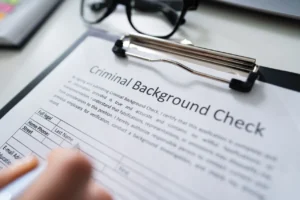Evicting a tenant should always be the final resort.

How Many Noise Complaints Until Eviction?
It always starts small. Maybe a renter blasts the music a little too loud late at night. Or, maybe they throw a party that people can hear all the way downstairs. At first, everyone tells themselves a little noise here and there is just part of apartment living… until it’s not. The noise keeps coming, and soon, someone files a complaint. But how many noise complaints until eviction is on the table?
In this guide, we’ll break down what counts as a noise complaint, how landlords handle them, and the point when being evicted is in the cards for tenants. Read along to learn more.
Main Takeaways
- Landlords listen to complaints, gather details, and show empathy to understand the noise issue.
- They discuss the concern with the tenant causing the noise and refer to lease policies if necessary.
- If the noise persists despite warnings, landlords may escalate actions, with eviction being a last resort.
What Constitutes a Noise Complaint?
As an experienced property management company in Washington D.C., we can tell you: we’ve all been there, on both the tenant and landlord’s side–a renter accidentally plays the music too loud; their footsteps were a tad too heavy, or their dog started barking in the dead of night. At first, it feels like it’s just a blip on the radar, a part of apartment life. But when it doesn’t stop, you can’t help but wonder: how many noise complaints until eviction becomes a concern?
So, What’s Worthy of a Noise Complaint?
You could call any noise you make that is overly loud as being noise complaint-worthy. Here are some examples of that:
- Music or TV playing loudly
- Your pet barking or yelling
- Singing, yelling, or shouting loudly
- Children crying or playing loudly
- Partying loud in the middle of the night
- Meeting with others outdoors, right near people’s windows
- Jumping, running, or stomping
Need Legal Help?
Chat with a real estate lawyer near you. It’s only $5 for a 1-week trial. Ask unlimited questions.
How Landlords Handle Noise Complaints
If you’re a landlord, you already know the job isn’t just about fixing leaky faucets or collecting rent. It’s also about making sure people feel comfortable in their homes. And let’s be honest—peace and quiet are a big part of that.
Here’s a simple way to deal with noise issues and keep the peace.
-
Listen First—and Show You Care: When a tenant reaches out about noise, take the time to really listen. They’re coming to you because it’s bothering them, and they’re hoping you can help. A little empathy goes a long way.
-
Get the Full Story: Gather all the details about the complaint. You can ask when the noise happens. Is it late at night? Or early morning? How often does it occur? What kind of noise it is. Music? Shouting? Footsteps? If they can tell you where it’s coming from, even better.
-
Talk It Out: Have a calm, respectful talk with the tenant who’s making the noise. Keep things friendly—they might not even realize they’re being loud. Let them know there’s been a concern and see if you can work together on a fix.
-
Point Back to the Lease: If the problem doesn’t get better, it’s time to refer to the lease. Hopefully, you’ve got a noise policy in there already (quiet hours, limits on loud activities, that sort of thing). If not, this might be a good moment to add one for the future. For now, remind them of the rules and let them know what happens if things don’t improve—whether that’s a formal warning or something more serious.
-
Follow Through: If the noise continues after you’ve had that initial conversation and given a warning, it’s time to take the next step. Depending on your lease agreement, this could mean sending another reminder, issuing a formal violation notice, and, if they don’t listen to that notice, starting the eviction process (though that’s usually a last resort).
Can Landlords Evict a Tenant Over Noise?
The short answer is yes—but it’s not as simple as just handing over a notice and changing the locks. Washington, D.C. has strict eviction laws, and landlords must follow a thorough legal process. Evicting a tenant should always be the final resort.
If a tenant repeatedly violates their lease and disrupts the peace, the landlord might have grounds to move forward legally. That said, it’s always your best bet to address the problem early—start with a friendly conversation, issue a formal warning if you need to, and give tenants a fair chance to fix their violation.
What Tenants Should Do If They Receive a Noise Complaint
Sometimes, you might be disrupting the peace without even knowing it. Sound travels in strange ways—what seems like a reasonable volume to you might reverberate into your neighbors’ walls like a megaphone. If you ever get a noise complaint, don’t panic. It’s not the end of the world, and you can take simple steps to deal with it:
-
Get the Details: Find out when you made too much noise and what exactly was bothering your neighbor. The more you know, the easier it is to figure out what’s going on.
-
Respond Respectfully: Whether it’s your landlord or neighbor, respond in a calm, respectful way. Let them know you understand their concerns and you’re open to making changes.
-
Make Changes: If you make changes, that can make a big difference. Turn down the volume, move furniture away from shared walls, or lay down rugs to soften your footsteps. If you like hosting people, be mindful of quiet hours.
-
Follow the Rules: Most leases or community guidelines mention quiet hours. Make sure you’re sticking to them to avoid future complaints. Once you’ve made those fixes, check in with your landlord (or your neighbor) to make sure you’ve done what you’ve needed to do.
What is the Legal Process Noise Complaint-Based Evictions?
No landlord ever wants things to reach this point, and they typically try every method in their arsenal to avoid it. But when noise complaints keep piling up—and a tenant isn’t willing to make changes—their only option left may be to evict the tenant.
-
Warnings Come First: Before anything else happens, the landlord typically gives the tenant a written warning. This is a formal reminder to follow lease rules—especially any noise policies.
-
Document Everything: Landlords should document every complaint, conversation, and warning. This creates a clear paper trail showing the landlord tried to resolve the issue before taking legal action.
-
Notice to Cure or Quit: If the tenant still makes too much noise after their warnings, the landlord’s next step is to send a “Notice to Cure or Quit.” This tells the tenant they have a certain amount of time (usually a few days) to fix the problem—or move out. In Washington, D.C., landlords are required to give proper written notice before filing for eviction.
-
Filing for Eviction: If the tenant still doesn’t correct course or move out, the landlord can file an eviction lawsuit (called an “unlawful detainer” case) in court. The tenant will be notified and have a chance to respond.
-
Court Hearing: Here, the landlord and tenant will each present their side of the story. The judge reviews the evidence—noise complaints, warnings, and lease violations. Then, if the court rules the landlord’s favor, they’ll issue an eviction order.
-
Eviction Enforcement: If things get this far, the tenant will be court-ordered to move out by a set date. If they don’t, law enforcement may get involved to enforce the eviction.
So, how many noise complaints until eviction? There’s no one-size-fits-all answer. Usually, it depends on how the tenant responds to the warnings and whether they do enough to resolve the issue. If they ignore repeated complaints or fail to cooperate with their landlord, they widen their chances of getting evicted.
Source: Bay Property Management Group













 Accessibility
Accessibility